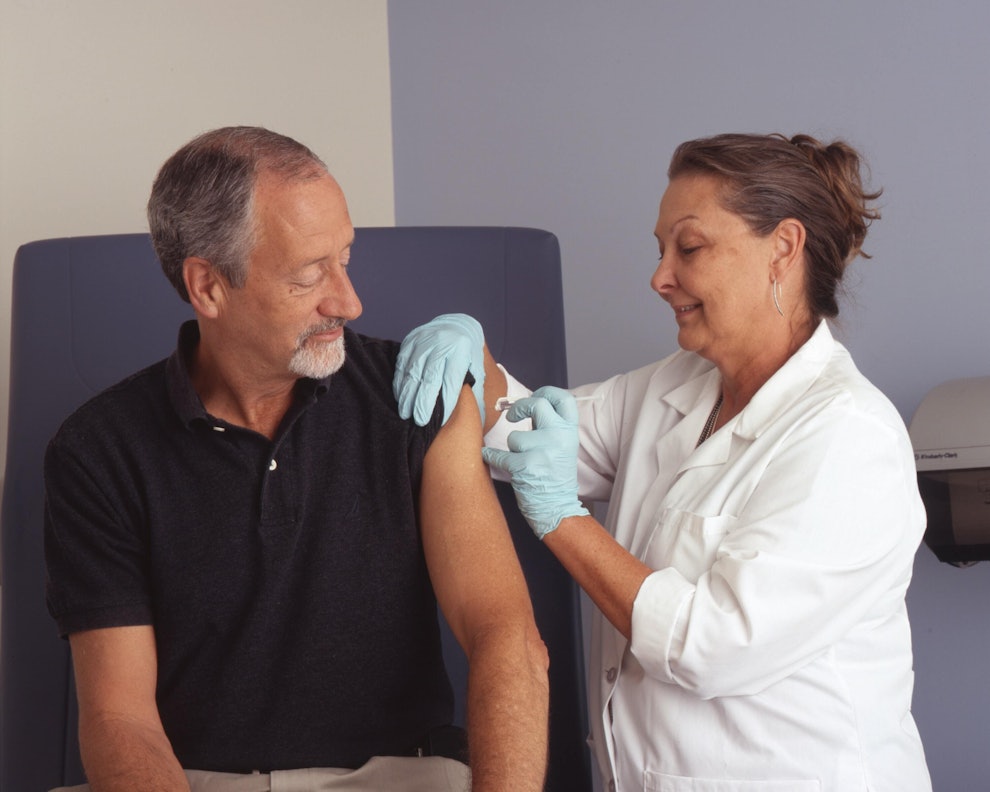Does Medicare Cover The Shingles Vaccine? What You Need To Know
Article at a glance
Vaccinations are an important part of both public and individual health. The Centers for Disease Control and Prevention (CDC) recommends various types of vaccines for people throughout their lifetimes, including the tetanus shot and shingles vaccine.
While Original Medicare does not cover the shingles vaccine, Medicare Part D, Medicare’s prescription drug coverage, covers all commercially available shots, including the shingles shot.
Medicare Advantage plans may have different coverage options for vaccines. Individuals enrolled in a Medicare Advantage plan should confirm vaccination coverage with their insurance company.

Vaccinations are a vital component of keeping both individuals and communities safe and healthy. Medicare covers some vaccines. These include the flu shot, hepatitis B shot, pneumococcal shots, and COVID-19 vaccines.
There are a variety of vaccines the Centers for Disease Control and Prevention (CDC) encourage children and adults to receive throughout their lifetime to prevent disease. One of these vaccinations is the shingles shot.
The CDC recommends the shingles vaccine for healthy adults over the age of 50. While Original Medicare does not cover the shingles vaccine, Medicare Part D does cover the shingles vaccine. This article will explain everything Medicare beneficiaries need to know about Medicare and vaccine coverage, specifically in regards to the shingles vaccination.
What is Shingles?
Shingles, also known as herpes zoster, is caused by the varicella zoster virus (VZV). Varicella zoster is the same virus that causes chickenpox. For people who’ve had chickenpox earlier in life, the varicella zoster virus stays dormant in their bodies. Later on, it can reactivate and cause shingles.
Symptoms of shingles include:
A painful or itchy rash on one side of the face or body
Fever
Headache
Chills
Upset stomach
About one out of three Americans will develop shingles in their lifetime.
Learn more about the signs and symptoms of shingles.

What is the Shingles Vaccine?
The shingles vaccine protects against shingles and other complications associated with the disease. The shingles vaccine, also known as recombinant zoster vaccine (RZV) or Shingrix, is recommended for adults 50 years and older.
The Shingrix vaccine is available at both the doctor’s office as well as the pharmacy. It is administered via a shot in the upper arm. While the Shingrix vaccination is safe, there are some side effects that may be possible. These include:
- Sore arm
- Redness or swelling at the injection site
- Muscle pain
- Fatigue
- Shivering
- Fever
- Stomachache
- Nausea
Side effects usually wane after two to three days. Side effects are most common in younger individuals.
Learn more about the shingles vaccine.
What is Postherpetic Neuralgia?
Shingrix is the only means to get protection from shingles, as well as its most common complication, postherpetic neuralgia (PHN). PHN is long-term nerve pain after becoming ill with shingles. PHN occurs in parts of the body where the shingles rash was present. This nerve pain can interfere with daily activities and be debilitating. PHN is most common in older adults; rarely do adults under the age of 40 experience PHN.
Two doses of Shingrix are more than 90% effective at preventing shingles, as well as PHN. This protection from two doses will stay above 85% for at least the first four years after receiving the Shingrix vaccination.
Who Should Get The Shingles Vaccine?
Healthy adults over the age of 50 should receive two doses of Shingrix, though there is no maximum age for Shingrix. Doses should be separated by two to six months. People should still get the Shingrix vaccine even if they’ve had shingles previously, received the Zostavax vaccine, or are unsure if they have had chickenpox.

Who Should Not Get The Shingles Vaccine?
There are certain populations that should not get the Shingrix vaccination. According to the CDC, these groups include:
- Those who have had a severe allergic reaction to any component of Shingrix
- Those who have tested negative for immunity to VZV; these individuals should get the chickenpox vaccination instead
- Those who are currently ill with shingles
- Those who are pregnant or breastfeeding.
People with suppressed immune systems and multiple chronic illnesses should always have a discussion with a doctor before getting any vaccination, especially with Shingles, since it is a live vaccine, and in a weakened body can cause chicken pox.
Does Medicare Cover The Shingles Vaccine?
Original Medicare does not cover shingles shots. As a reminder, Medicare Part A is Medicare’s hospital insurance and Medicare Part B is Medicare’s medical insurance. While Medicare Part B covers preventive services, these vaccines are not included under its coverage, even though it does prevent shingles.
That said, Medicare prescription drug plans, known as Medicare Part D, cover all commercially available vaccines needed to prevent illness, including the tetanus shot and shingles vaccine.
Learn more about Medicare coverage and the shingles vaccine.

What is Medicare’s Prescription Drug Coverage?
Medicare Part D prescription drug coverage includes coverage for the shingles vaccination. Medicare Part D plans will cover the shingles vaccine cost.

Do Medicare Advantage Plans Cover Shingles Vaccines?
Medicare Advantage plans are Medicare plans offered by private insurance companies that are Medicare-approved. A Medicare Advantage plan, also known as Medicare Part C or an MA plan, will provide, at minimum, standard Medicare coverage. Many Medicare Advantage plans also offer additional health benefits, including vision, dental, hearing, prescription drug benefits, and more.
Medicare beneficiaries interested in a Medicare Advantage plan should always confirm extra perks with their insurance company. That said, most Medicare Advantage plans include Part D coverage within their health plans. Therefore, it is likely the shingles vaccine will be covered.
What Are The Shingles Vaccine Costs?
Starting in January 2023, the Inflation Reduction Act went into effect which helped medicare plans become more affordable, equitable, and accessible by reducing or eliminating cost-sharing. This new drug law impacted various parts of Medicare and Medicaid plans, providing nearly everyone with free or expansive coverage on vaccinations such as Shingrix.
Medicare Prescription Drug Plan (Part D)
With the new drug law, Medicare Part D plan holders no longer need to pay copayments or apply their deductible to any prescription drugs the CDC deems necessary. Luckily, one of those drugs approved by the Advisory Committee on Immunization Practices (ACIP) is Shingrix. See the full list of vaccines covered by the new drug law.
It’s important to note that coverage varies by provider and state so it’s important to contact your insurance provider and doctor’s office prior to getting your vaccine to ensure you’re covered. Eligible individuals should receive Shingrix at a doctor’s office within the drug plan’s network or at an in-network pharmacy to avoid any out-of-network costs.
Medicaid
Most states cover Shingrix for those with Medicaid insurance plans. However, coverage for Medicaid varies state by state so it’s important to contact your provider to ensure you’re covered. For a complete list of states where shingles vaccinations are covered, visit the Shingrix website for more information.

How to Get Help Paying For The Shingles Shot
Finally, there are certain pharmaceutical companies that provide vaccines to eligible individuals who are unable to pay for them. Shingrix is manufactured by GlaxoSmithKline (GSK). Learn more about costs and potential programs at its official website.
FAQ
How long is the shingles vaccine (Shingrix) effective for?
Shingrix’s efficacy lasts upwards of 10 years after both recommended doses have been received.
Sources
Become a patient
Experience the Oak Street Health difference, and see what it’s like to be treated by a care team who are experts at caring for older adults.




